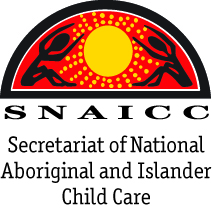SNAICC – Proposed changes to Budget Based Funded program will have negative impact on our children and families

Statement by Geraldine Atkinson, SNAICC Deputy Chairperson (Early Childhood)
SNAICC is extremely concerned that recommendations in the review of the Budget Based Funded (BBF) program have the potential to drastically change the program’s focus and have a detrimental impact on Aboriginal and Torres Strait Islander children and families.
The BBF program funds some 270 Aboriginal early childhood services, which provide an array of services beyond child care — including nutrition, transport, family support, health and early intervention programs.
SNAICC identifies particular concerns across the following areas of the BBF review:
Service sustainability and the transition to Child Care Benefit
SNAICC is highly concerned about the emphasis placed on BBF services eventually becoming self-sustaining. While SNAICC believes BBF services should be supported to seek additional funding, this recommendation ignores the reality that many of these services operate in disadvantaged communities where a mainstream, self-sustaining child care model, that relies on the community paying, is not feasible. The review appears to contradict its own recommendation when it identifies that these services are usually located in communities where the market is unable to support the viable operation of the service.
Linked to this, SNAICC is extremely concerned with the recommendation that some BBF services be transitioned to Child Care Benefit (CCB) funding. While there are limitations in the current BBF model, simply shifting services to the mainstream childcare funding model is clearly not the answer.
Many services and sector experts have reinforced to SNAICC compelling reasons why the model would be incompatible for many Aboriginal and Torres Strait Islander early childhood services. Likely impacts include:
- Decline in Aboriginal and Torres Strait Islander children participation due to raised costs and heightened administrative requirements;
- Limited support for children with additional needs; and
- Increased need for services to admit high, fee-paying enrolments, rather than focusing on children most in need.
Requirement to charge fees
Key to BBF services’ ability to deliver culturally-centred care to some of Australia’s most vulnerable communities is that they generally charge little or no fee, recognising that this is critical to enable access for their families. However, among the review’s eight recommendations are that a service fee requirement be introduced.
SNAICC is highly concerned that charging fees will limit participation of the most disadvantaged families and children. Many BBF services do currently charge fees. Those that don’t, do this for a reason —namely that they understand that charging a fee would limit participation in vital early childhood and family support programs.
SNAICC does, however, support the recommendation that where services do choose to charge fees, the amount be set by the service based on the profile of the community and the families who attend the service.
Refocusing of program objectives
SNAICC is concerned that the review does not include a focus on urban centres in addition to regional and remote services. Evidence clearly indicates that there are still disadvantaged Aboriginal and Torres Strait Islander populations within urban centres. We maintain that there is a strong need for culturally appropriate, integrated and affordable Aboriginal and Torres Strait Islander early years services within urban, regional and remote areas.
We are also highly concerned that the review recommends a shift of the program objective to be limited to child care and early learning services — this change ignores the need for multifunctional and integrated early years and family support services, such as the Multifunctional Aboriginal Children’s Services (MACS) model.
We also dispute the assumption that the existence of the National Quality Framework negates the need for culturally competent services for Aboriginal and Torres Strait Islander children and families. This need still exists, regardless of the existence of the NQF. The review has ignored the unique strengths of community-controlled services in family and community engagement, passing on culture, and supporting positive cultural identity for young children. It has also ignored the contribution of these services to Aboriginal and Torres Strait Islander community development and employment.
SNAICC does however support the emphasis on embedding quality and continuous improvement practices within BBF services, and agrees that measures need to be taken to “reduce administrative burden and improve the effectiveness of administrative obligations to benefit services and departmental management.”
In conclusion, SNAICC strongly believes that any reform of the BBF program must respond to and seek to address the persistently low educational, health and wellbeing outcomes experienced by Aboriginal and Torres Strait Islander children.
Any changes to the current non-mainstream early childhood education and care model must ensure that they advance rather than undermine these outcomes.
Media inquiries:
Frank Hytten, SNAICC CEO, on 0432 345 652;
Holly Mason-White, SNAICC Senior Policy Officer, on 0405 827 274
Giuseppe Stramandinoli, SNAICC Media Officer, on 0419 508 125
